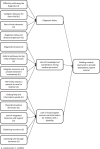Experiences of patients with metachromatic leukodystrophy, adrenoleukodystrophy, or Krabbe disease and the experiences of their family members: a qualitative systematic review
- PMID: 38533650
- PMCID: PMC11230659
- DOI: 10.11124/JBIES-23-00303
Experiences of patients with metachromatic leukodystrophy, adrenoleukodystrophy, or Krabbe disease and the experiences of their family members: a qualitative systematic review
Abstract
Objective: This review aimed to synthesize the experiences of patients with metachromatic leukodystrophy, adrenoleukodystrophy, or Krabbe disease and the experiences of their families.
Introduction: Leukodystrophies are metabolic diseases caused by genetic mutations. There are multiple forms of the disease, varying in age of onset and symptoms. The progression of leukodystrophies worsens central nervous system symptoms and significantly affects the lives of patients and their families.
Inclusion criteria: Qualitative studies on the experiences of patients with leukodystrophies and their family members were included. These experiences included treatments such as enzyme replacement therapy and hematopoietic stem cell transplantation; effects of tracheostomy and gastrostomy; burdens on the family, coordinating care within the health care system, and family planning due to genetic disorders. This review considered studies in any setting.
Methods: MEDLINE (Ovid), CINAHL Plus (EBSCOhost), APA PsycINFO (EBSCOhost), Scopus, and MedNar databases were searched on November 18, 2022. Study selection, critical appraisal, data extraction, and data synthesis were conducted in accordance with the JBI methodology for systematic reviews of qualitative evidence, and synthesized findings were evaluated according to the ConQual approach.
Results: Eleven studies were eligible for synthesis, and 45 findings were extracted corresponding with participants' voices. Of these findings, 40 were unequivocal and 5 were credible. The diseases in the included studies were metachromatic leukodystrophy and adrenoleukodystrophy; no studies were identified for patients with Krabbe disease and their families. These findings were grouped into 11 categories and integrated into 3 synthesized findings, including i) providing care by family members and health care providers as physical symptoms progress, which relates to the effects of the characteristics of progressive leukodystrophies; ii) building medical teamwork to provide appropriate support services, comprising categories related to the challenges experienced with the health care system for patients with leukodystrophy and their families; and iii) coordinating family functions to accept and cope with the disease, which included categories related to family psychological difficulties and role divisions within the family. According to the ConQual criteria, the second synthesized finding had a low confidence level, and the first and third synthesized findings had a very low confidence level.
Conclusions: The synthesized findings of this review provide evidence on the experiences of patients with metachromatic leukodystrophy or adrenoleukodystrophy and their families. These findings indicate that there are challenges in managing a patient's physical condition and coordinating the health care system and family functions.
Review registration: PROSPERO CRD42022318805.
Supplemental digital content: A Japanese-language version of the abstract of this review is available [ http://links.lww.com/SRX/A49 ].
Copyright © 2024 The Authors. Published by Wolters Kluwer Health, Inc. on Behalf of JBI.
Conflict of interest statement
YK has received research grants and honoraria from Takeda Pharmaceutical Company Limited. NS has received research grants and honoraria for lectures from Takeda Pharmaceutical Company Limited and JCR Pharmaceuticals. The other authors declare no conflicts of interest.
Figures




References
-
- Escolar ML, West T, Dallavecchia A, Poe MD, LaPoint K. Clinical management of Krabbe disease. J Neurosci Res 2016;94(11):1118–1125. - PubMed
-
- Koto Y, Sakai N, Lee Y, Kakee N, Matsuda J, Tsuboi K, et al. Prevalence of patients with lysosomal storage disorders and peroxisomal disorders: a nationwide survey in Japan. Mol Genet Metab 2021;133(3):277–288. - PubMed
-
- Pinto R, Caseiro C, Lemos M, Lopes L, Fontes A, Ribeiro H, et al. Prevalence of lysosomal storage diseases in Portugal. Eur J Hum Genet 2004;12(2):87–92. - PubMed
Publication types
MeSH terms
LinkOut - more resources
Full Text Sources
Medical

